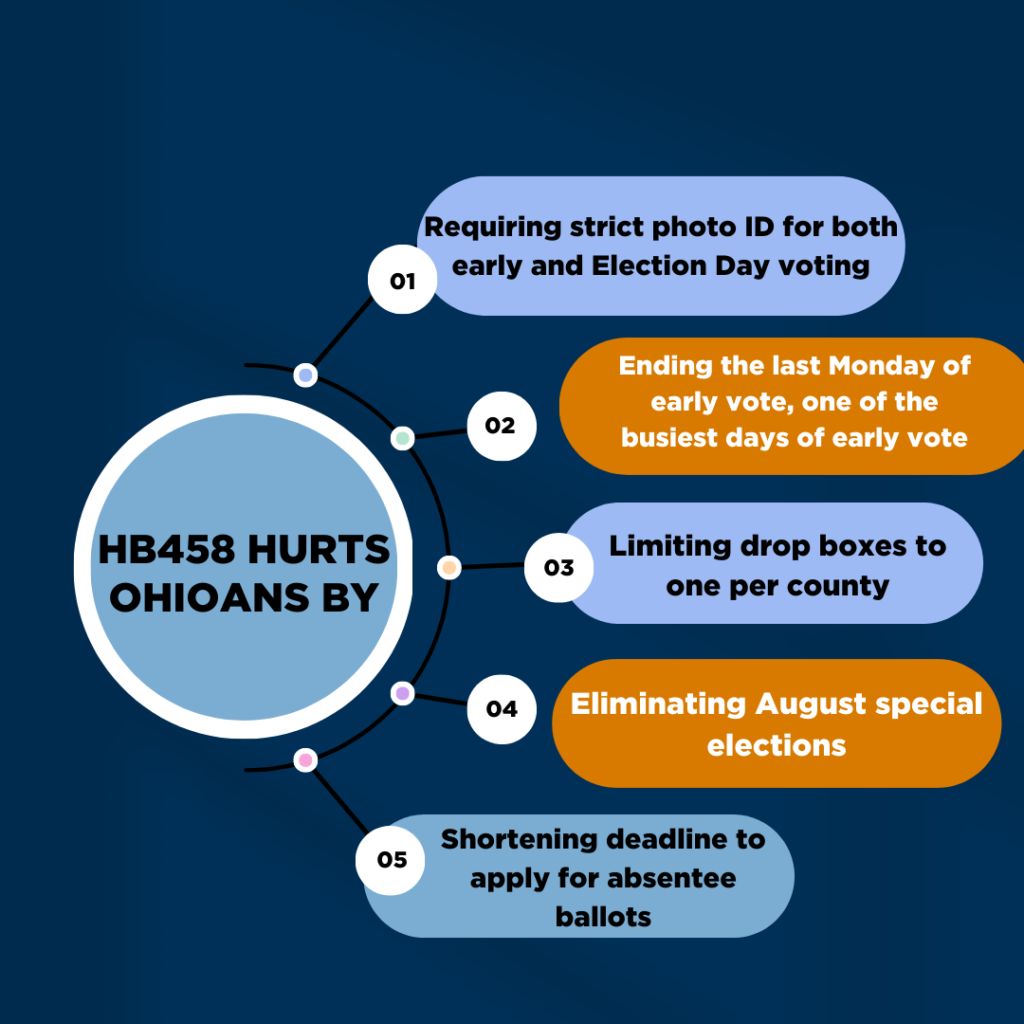After hours on Friday, January 6, 2023, Governor Mike DeWine signed House Bill 458 (HB 458) into law. While originally proposed in 2021 as a 15-page bill intended to eliminate most August special elections, the final 157-page version amended by House Republicans and enacted by DeWine, features an extensive list of alarming updates to Ohio’s election laws, including: a photo identification (ID) requirement for all voters, including provisional voters and those confined in Ohio jails or hospitals; the elimination of early voting on Mondays before Election Day and the six additional hours it provides voters to cast their ballots; a prohibition against a single 24/7 ballot drop box at county Boards of Elections (BOE); and the requirement that absentee ballots be requested sooner and received by BOEs by the close of polls on Election Day, regardless of their postmark date. Touted as an opportunity to promote election integrity, voting rights organizations across the state rightfully beg to differ.
In the days leading up to the passage of HB458, the Ohio Conference of the National Association for the Advancement of Colored People (NAACP) and the Ohio branch of the American Civil Liberties Union (ACLU), among other progressive organizations, protested the law’s failure to address the anticipated impact of this law on Ohio’s most vulnerable communities. According to Innovation Ohio’s President and CEO, Desiree Tims: “Experts tell us that as many as 11% of Ohio adults do not have a driver’s license or state ID card. Younger Ohioans are driving less, and many older and low-income Ohioans do not drive. That’s over 800,000 eligible adults who would have significant trouble voting under HB 458. If Governor DeWine values the freedom to vote and civil rights of Ohioans, then he will veto HB 458.”
Tim’s sentiments speak to the burden associated with obtaining a photo ID that will disproportionately fall upon poor, disabled and transient citizens that do not presently meet the requirements under HB 458; populations overrepresented by women and members of Black and immigrant communities. In practice, the cost of transportation to and from the Bureau of Motor Vehicles (BMV) where IDs must be obtained, and the administrative hassle associated with compiling the documents necessary to present to BMV officials, will operate as a sort of poll tax, and thus deterrent, for those who historically were able to provide various alternatives to photo ID as proof of identity at polling locations. Recent developments have also confirmed that certain Veteran ID cards will also be excluded from those accepted at BOEs; disenfranchising the very citizens whose sacrifices make American democracy possible.
This past December, North Carolina’s Supreme Court struck down a voter ID law for its disparate impact on Black voters and proof of discriminatory intent. Hoping for a similar outcome, the Northeast Ohio Coalition for the Homeless, Ohio Federation of Teachers, Ohio Alliance for Retired Americans and Union Veterans Council filed suit against Ohio’s Secretary of State Frank Larose and the 88 BOEs that will enforce the law. Arguing that it “will severely restrict Ohioans’ access to the polls—particularly those voters who are young, elderly, and Black, as well as those serving in the military and others living abroad” and “imposes needless and discriminatory burdens on Ohioans’ fundamental right to vote” in violation of the First and 14th Amendments of the U.S. Constitution, the Plaintiffs are prepared to exhaust all legal remedies to protect Ohio voters.
Until the courts reach a resolution, advocates must focus on educating their constituents regarding these sudden changes to Ohio’s election law, name those responsible for its enactment and prepare for an ultimately unfavorable decision in light of the Ohio Supreme Court’s composition. In doing so, voters will be empowered to recognize their allies and dispel the myth that Ohio Republican’s obsession with election integrity is anything more than voter suppression in disguise.
